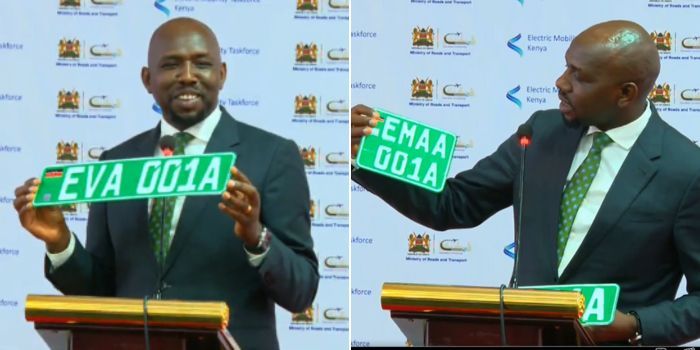The Kenyan government has introduced green number plates designed specifically for electric vehicles. This happened on Wednesday as part of an effort to increase the country’s reliance on electric vehicles. All electric vehicles, including electric motorcycles, will be required to have the designated licence plates.
The government is actively encouraging the adoption of electric vehicles in an effort to lessen the country’s dependence on fossil fuels and decrease carbon emissions.
Kenya is taking a giant leap towards more environmentally friendly transportation, according to Transport Cabinet Secretary Kipchumba Murkomen, who made the announcement at Wednesday’s draft e-mobility policy launch at the Kenyatta International Convention Centre (KICC). The policy calls for the issuance of unique licence plates to motorcyclists and electric vehicle drivers.
Read also: Ghana Aims for Electric Vehicle Adoption in Public Transport
The transition to electric vehicles (EVs) considerably decreases greenhouse gas emissions and lowers the petroleum import bill, which is currently at KES 628.4 billion, according to Kipchumba Murkomen, Kenya’s Cabinet Secretary for Roads and Transport.
The CS claims that the green number plates will bring more attention to electric vehicles. More people will be encouraged to consider switching to e-mobility in the long run by this change.
Specifically, green licence plates are reserved for official vehicles used by Kenyan national governments. Number plates for county government vehicles will need to be changed to a different colour moving forward.
An unveiling of the Draft National Electric Mobility Policy took place while Murkomen was speaking. The public is welcome to weigh in on the National Electric Mobility Policy Draft at this time. The policy’s stated goal is to promote the expansion of electric mobility across all land, air, and sea transportation modalities.
In addition, it will provide a detailed plan for Kenya to move away from ICEs, which are currently in use. Incentives for electric vehicle adoption and local manufacturing support are also proposed in the policy draft. Murkomen observed that additional manufacturing jobs would be created as a result of the expansion of the electric vehicle sector. The government has pledged to develop the fledgling sector by enlisting the help of private sector actors, foreign investors, and academic institutions.
The Kenyan government is actively preparing to switch to electric vehicles. The primary goal of this plan is to reduce the financial strain on taxpayers caused by the upkeep of fuel and ICE vehicles.
CS Murkomen announced that a plan to gradually switch over all GoK vehicles from gas-powered to electric vehicles is being presented to the Cabinet. Over time, this will help save the government a tonne of money on fuel and maintenance. In addition, the Ministry’s headquarters will soon have to charge infrastructure.
Kenya and US Millennium Change Corporation
Kenya and the United States Millennium Change Corporation (MCC) inked a Ksh.8.7 billion ($60 million) agreement in September 2023. Known as the Kenya Urban Mobility and Growth Threshold Programme, the MCC deal is a government initiative.
Read also: Possible EVs aims to introduce electric vehicles, for a greener Nigeria
Four projects in Kenya were funded through the programme. Three separate projects are currently underway: Integrated Transport Planning, First and Last Mile Connections, and Detailed Land Use. Lastly, it will pay for the BRT Project or bus rapid transit.
The purpose of the agreement is to provide funding for the purchase of electric buses for the Bus Rapid Transit system in Nairobi. It was recently announced that all vehicles operating on Nairobi’s Bus Rapid Transit (BRT) network will be environmentally friendly.
There was also an African Climate Summit in Nairobi, which the announcement follows. The government’s goal of making Nairobi more efficient and cleaner is being reaffirmed by this.

















Kenya can’t run